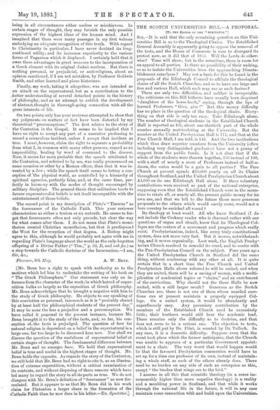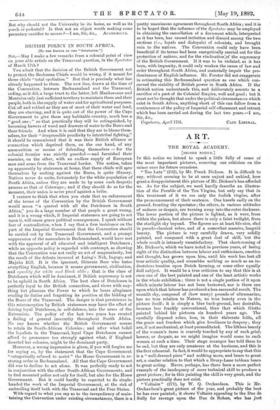THE SCOTCH UNIVERSITIES BILL.—A PROPOSAL.
LTO THE XDITOR or THY " SPIICTATOR.1
Stn,—It is said that the only remaining question on this Uni- versities Bill is as to the Theological Chairs. The Established General Assembly is apparently going to oppose the removal of the tests, and the House of Commons is sure to disregard its protest now, as it did that of 1853. Will the Lords do other- wise? Time will show; but in the meantime, there is room for an appeal to all parties. Is there no possibility of their uniting, so as to isolate the Universities from the approaching Disesta- blishment cataclysm ? May not a basis for this be found in the proposals of the Edinburgh Council to affiliate the theological chairs of all the Scotch Churches, and so to have one large and free and various Hall, which each may use as each desires ?
There are only two difficulties, and neither is insuperable. The criticisms on this Bill hitherto have usually been disguised "daughters of the horse-leech," crying, through the lips of learned Professors, " Give, give !" But this money difficulty has no place in the question of the theological chairs. Every- thing on that side is only too easy. Take Edinburgh alone. The number of theological students in the Established Church Hall is reported as 101, about one-thirtieth part of the whole number annually matriculating at the University. But the number at the United Presbyterian Hall is 111, and that at the Free Church Hall, I am told, is 146. And the two institutions which thus draw superior numbers from the University (often including very distinguished graduates) have not a penny of support from the public funds. Is it not clear that if the whole of the students were thrown together, 330 instead of 100, with a staff of nearly a score of Professors instead of half-a- dozen, the union would be a gain to all parties ? The Free Church at present spends £10,000 yearly on all its Chairs throughout Scotland, and the United Presbyterian Church about 24,000 on its one Edinburgh Hall alone. If these voluntary contributions were received as part of the national enterprise, supposing even that the Established Church were in the mean- time to retain all, or nearly all, the present public money for its own use, and that we left to the future those more generous proposals to the others which would surely come, would not a. bare country be enriched all round ?
Its theology at least would. All who know Scotland (I do not include the Cockney reader who is charmed rather with our questions of organ and ritual), know that its Theological Col- leges are the centres of a movement and progress which really exist. Presbyterianism, indeed, like every truly constitutional system, does not move very fast. But it moves, notwithstand- ing, and it moves organically. Last week, the English Presby- terian Church resolved to remodel its creed, and to confer with the Pan-Presbyterian Council on the subject. Four years ages the United Presbyterian Church in Scotland did the same thing, without conferring with any other at all. It is quite certain that in a short time the Free Church and United Presbyterian Halls above referred to will be united, and when they are united, there will be a saving of money, with a multi- plication of academical topics or "chairs," and an enrichment of the curriculum. Why should not the three Halls be now united, with a still larger result ? Generous as the Scotch Churches are, there is not one of them whose unaided exer- tions can at present maintain a properly equipped Col- lege. On a united system, it would be abundantly and superfluously easy. Any pecuniary contribution by the members of the Established Church need be excessively little; their brethren would still bear the academic load.
There remains only the difficulty as to doctrine, and that does not seem to be a serious one. The objection to tests, which is still put by Dr. Flint, is scouted by Dr. Tulloch. In any case, it is a domestic difficulty. Suppose even that the event took place which the former anticipates, that the Church was unable to approve of a particular Government appoint- ment to a chair. The very worst that would happen would.
be that the favoured Presbyterian communion would have to set up for a time one professor of its own, instead of maintain- ing a whole staff, as each of the others already does. There need be no burden on any side of such an enterprise as this, except " the burden that wings are to the bird."
I assume in all this that scientific theology (in a sense im- measurably higher than mere negative theology) is a reality and a moulding power in Scotland, and that while it works through the national life in the future, it will in any case maintain some connection with and build upon the Universitiees But why should not the University be its home, as well as its porch or pedestal? Is that not an object worth making some pecuniary sacrifice to secure am, Sir, &c., Acantmtcus.



































 Previous page
Previous page